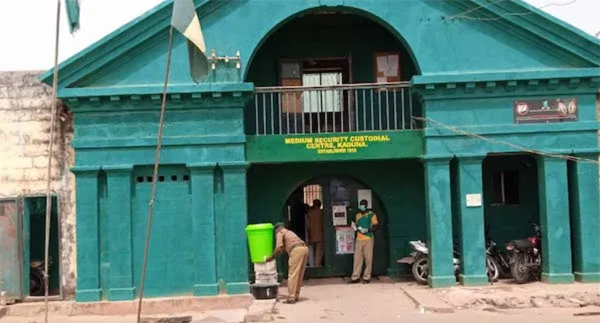A recent report that inmates at various correctional centres across the country are malnourished brings to the fore, again, the urgency of reordering the intentions and priorities of those facilities.
That report also carries with it allegations that the centres have become citadels of injustice, human rights violations and deliberate acts of dehumanization against inmates who are merely unfortunate victims of a wider societal malaise.
This is even as an independent investigative panel assembled by the Minister of Interior, Olubunmi Tunji-Ojo, in September last year, to investigate alleged corruption and other violations against the Nigeria Correctional Service (NCoS), recently confirmed that inmates were dying from hunger.
The secretary of the panel, Dr Uju Agomoh, while briefing the media last month, said their findings showed that many inmates in most custodial centres were facing death from hunger due to poor feeding and rampant food racketeering.
According to her, during the panel’s inspection visit in February 2025, there was no food up to the approved weekly standards by the service as the stock they are supposed to have for at least seven days, as is the practice, is not available
It is no longer news that nation’s correctional facilities are overcrowded.
Actually some are still exactly how they were at the country’s independence from colonialism several decades ago.
For a visitor to any of those centres, it is often a punishing experience. Apart from the dismal health outcomes, environment in those places is horrifying and disgraceful, justice system, where it exists, is slow, human rights are consistently violated, and savagery is the order of the day.
We recall that in October 2021, the Senate Committee on Interior approved the increase of the daily feeding allowance of the Nigerian Correctional Service (NCoS) from N450 per inmate to a minimum of N1, 000 per day.
NCS officials who were at the Senate to defend their 2022 budget had proposed N750 but members of the committee who described the amount as grossly inadequate jerked it up to N1, 000 in line with the current economic reality.
When the announcement of the increase was officially made by then Comptroller of NCS, most of the inmates in prisons across the country were ecstatic believing that their daily feeding portion would automatically increase.
Sadly, seven months down the line, reports indicate that the feeding portion of inmates has remained the same despite the purported increase by the government.
Also, we recall that on 31st of July 2019, the Correctional Service Act 2019 was enacted which repealed the Prison Act of 2004.
This was necessitated by the inadequacies of the then Prisons Act Cap. P 29 of 1972, Laws of the Federation of Nigeria (LFN).
The Nigerian Correctional Service Act 2019, aims to modernize the country’s correctional system in line with international best standards, by emphasizing human rights, rehabilitation, and reintegration of inmates.
The Act establishes a distinct Nigerian Correctional Service (NCoS), separate from the previous “Nigerian Prisons Service,” and outlines its objectives and functions, including providing safe and secure custody, implementing non-custodial measures, and fostering reformation and rehabilitation.
Section 2(1)(a) of the Act mandates the NCoS to fully comply with international human rights standards.
The Nigerian prison system was established in accordance with three forms of penal legislation which operate alongside each other in the country; the Penal Code and the accompanying Criminal Procedure Code Cap 81 Laws of the Federation 1990 (CPC); the Criminal Code and the accompanying Criminal Procedure Act Cap 80 Laws of the Federation 1990 (CPA) and the Sharia penal legislation in 12 northern states (which applies to only Muslim members of
those states).
By its establishment philosophy, the Nigerian prison service is an institution meant to administer penal treatment to adult offenders and it’s importance is in the bid to reduce crime in the society.
Nigeria has 256 prison establishments or Correctional Centres and as of March 3, 2025, the total prison population, including pre-trial detainees, was 80,183, with a reported official capacity of 50,153.
Out of this number, a total of 3,688 inmates are currently on death row across various correctional facilities in the country.
As a result, there is an occupancy level of 136.7 per cent, indicating a significant strain on resources and infrastructure.
Nigeria’s prisons are severely overcrowded, facing issues with inhumane conditions, and experiencing frequent jailbreaks.
The slow pace of the justice system, particularly in processing cases and executing death sentences, exacerbates prison congestion.
While acknowledging its role in creating a situation of prolonged detention and overcrowding, the federal government has, on numerous occasions, stated its willingness to reform the criminal justice system.
Unfortunately, though many Presidential Commissions and Committees have recommended reform of the criminal justice system, these recommendations have not been implemented.
What is going on is a cycle of repetitions, the government simply sets up new committees and commissions to study, review and harmonize previous recommendations with no effort made to implement any of the reports.
While the 2019 Act represents a significant step forward, its implementation faces challenges, including limited resources, inadequate infrastructure, and staff capacity.
The country has recorded numerous jailbreaks, resulting in the escape of over 7,000 inmates, including terrorists, since 2010.
Some notable incidents include the escape of 879 inmates, including 64 terrorists, from Kuje Prison in July 2022.
Corruption and lack of intelligence and security measures in the correctional facilities have been cited as contributing factors to the problem.
Our concern is that with the nagging problems in Nigeria Correctional facilities, it may be difficult for Nigerian society to have prisoners rehabilitated for better lives, as encapsulated in the Act.
In our opinion, except the right tools and right working atmosphere are provided, mere sloganeering will serve no useful purpose as all the goals for prisons reform will continue to remain a mirage.
The government has to make it clear, through financial and other necessary supports that the prison system has a responsibility to work on the inmates, so that they can be useful to themselves and the society in general upon their release.
Addressing the challenges in Nigeria’s prisons requires a multi-pronged approach focusing on decongestion, improving living conditions, enhancing rehabilitation programmes, and training correctional staff.
This includes building more facilities, addressing overcrowding, ensuring access to basic necessities, and promoting alternatives to incarceration.





